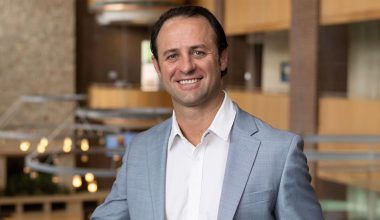Engineering leadership takes more than technical expertise; it requires a commitment to both environmental stewardship and human welfare. With experience at multinational corporations like Emerson, Pentair Flow Control, and Swagelok, Cash Nashery has developed practical approaches to implementing sustainable manufacturing leadership principles across global operations, turning sustainability from corporate talking points into measurable business advantages.
Real-World Safety Audits
There’s a clear difference between displaying safety measures and living them. Cash knows exactly how to spot the difference.
“We showed up at a site where everyone wore uniforms, safety glasses, and hearing protection,” he recalls. “They were proud of the setup, but the clothes still had fold lines from the packaging, and none of the glasses had a single scratch. It was obvious everything had just been unboxed for our visit.”
Rather than reprimanding the supplier, Cash takes a pragmatic, business-focused approach. “We frame it in terms of risk to their real assets, which aren’t the machines, but the people. If someone gets hurt, productivity suffers,” he explains. This mindset shifts the conversation from bare-minimum compliance to operational value.
When inspecting a facility, Cash’s team skips the paperwork and heads straight to the floor. “You don’t learn much by sitting in an office reading manuals or procedures, or listening to someone explain what’s supposedly happening,” he says. “We don’t waste time with staged records. I’ve seen safety stats literally painted onto boards—clearly not updated or written in. You learn a lot more by observing what’s actually happening in real time.”
Supplier Metrics That Matter
Cash emphasizes practical, easy-to-track metrics that suppliers can realistically adopt. “For sustainability, we like to see recycling of waste. You know how much raw material you purchased—so you should be able to account for where it went,” he explains. “The product weight plus the scrap weight should match the total incoming material. It’s simple math, but it tells a clear story.”
He added, “We had one supplier reduce landfill waste by 40% in just a year by simply tracking and reselling scrap in a more structured way. Once they saw the impact, they never looked back.”
He applies the same logic to machine oils and other consumables. The incentive becomes clear once suppliers realize these practices help them win more business. “Some oil and gas companies have embraced environmental responsibility regardless of the political climate,” Cash adds. “When we demonstrate that these metrics actually drive growth—and back it up with results—suppliers start to take it seriously. They see our business expanding, and they want to be part of it.”
This emphasis on supplier ESG (Environmental, Social, and Governance) compliance not only adds operational value but also aligns partners with larger corporate sustainability goals.
Global Engineering Alignment
Collaborating with engineering teams across Germany, China, India, Mexico, and the U.S. means navigating diverse workplace cultures and expectations. Cash has learned that real adoption of sustainability initiatives requires alignment from top leadership to the shop floor. “Social responsibility has to start with the executive team, but it also needs to be understood and embraced at the grassroots level,” he explains. “If engineers and operations staff don’t see their local manager prioritizing it, my direct engagement alone won’t move the needle.”
These dynamics become even more complex in international reporting structures. “I’ve had teams that were officially under my management, but culturally, they still viewed the local site manager as their true authority. If that individual wasn’t aligned with the initiative, implementation lagged, regardless of what I directed.”
When mentoring engineering leaders, Cash leads with humility. “Just because I’m your manager or director doesn’t mean I know more than you. You’re the subject matter expert—if I’m wrong, challenge me,” he says. This approach builds trust and encourages ownership, while reinforcing clarity around roles and decision-making.
He also makes a direct connection between sustainability and product performance. “If we don’t carefully consider material selection and avoid hazardous substances, like coatings that contain heavy metals such as hexavalent chromium, we’re setting ourselves up for long-term failure. Eventually, it catches up in the form of compliance issues, reputational risk, or lost business. Reflecting on his background, he adds: “Sustainability wasn’t part of the curriculum when I was in school, but over the years I’ve learned that social responsibility isn’t just about doing the right thing—it’s about building smarter, stronger businesses.”
Cash Nashery is the Managing Director of Nasher Consulting, EVP of Engineering and Quality at Known Group, and a member of the Board of Directors at Infratech Inc. He brings decades of experience in engineering operations best practices, global manufacturing leadership, and supplier development to help companies scale with both sustainability and efficiency in mind.
Follow Cash Nashery on LinkedIn to learn how engineering leadership can drive real-world impact.








